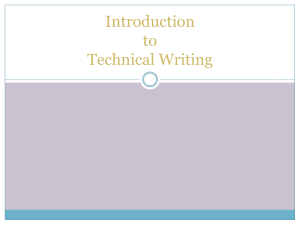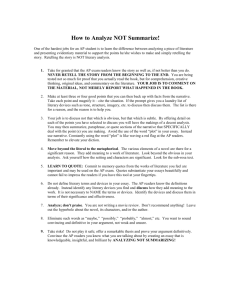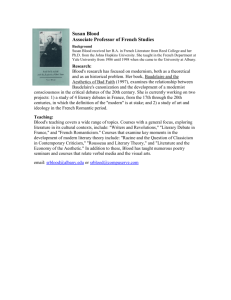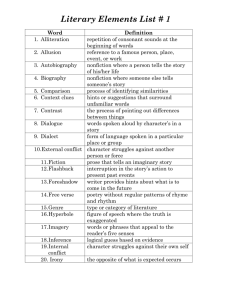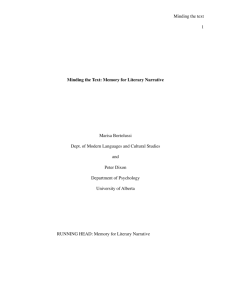Writing About Literature: Ten Hot Tips for Avoiding Common Errors
advertisement
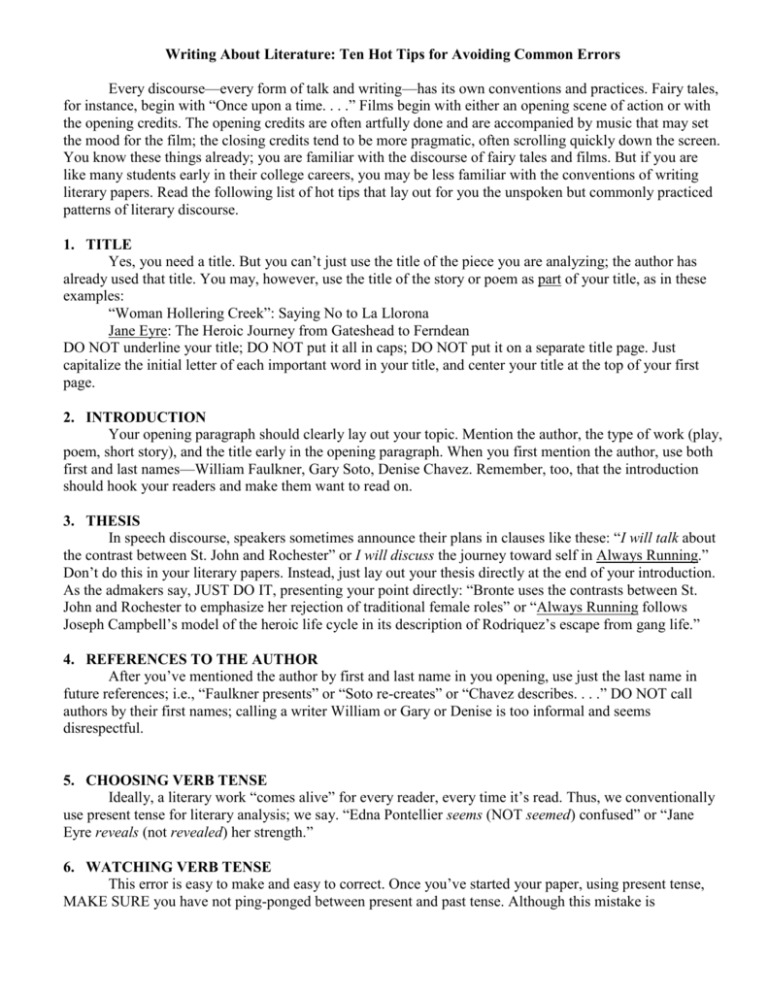
Writing About Literature: Ten Hot Tips for Avoiding Common Errors Every discourse—every form of talk and writing—has its own conventions and practices. Fairy tales, for instance, begin with “Once upon a time. . . .” Films begin with either an opening scene of action or with the opening credits. The opening credits are often artfully done and are accompanied by music that may set the mood for the film; the closing credits tend to be more pragmatic, often scrolling quickly down the screen. You know these things already; you are familiar with the discourse of fairy tales and films. But if you are like many students early in their college careers, you may be less familiar with the conventions of writing literary papers. Read the following list of hot tips that lay out for you the unspoken but commonly practiced patterns of literary discourse. 1. TITLE Yes, you need a title. But you can’t just use the title of the piece you are analyzing; the author has already used that title. You may, however, use the title of the story or poem as part of your title, as in these examples: “Woman Hollering Creek”: Saying No to La Llorona Jane Eyre: The Heroic Journey from Gateshead to Ferndean DO NOT underline your title; DO NOT put it all in caps; DO NOT put it on a separate title page. Just capitalize the initial letter of each important word in your title, and center your title at the top of your first page. 2. INTRODUCTION Your opening paragraph should clearly lay out your topic. Mention the author, the type of work (play, poem, short story), and the title early in the opening paragraph. When you first mention the author, use both first and last names—William Faulkner, Gary Soto, Denise Chavez. Remember, too, that the introduction should hook your readers and make them want to read on. 3. THESIS In speech discourse, speakers sometimes announce their plans in clauses like these: “I will talk about the contrast between St. John and Rochester” or I will discuss the journey toward self in Always Running.” Don’t do this in your literary papers. Instead, just lay out your thesis directly at the end of your introduction. As the admakers say, JUST DO IT, presenting your point directly: “Bronte uses the contrasts between St. John and Rochester to emphasize her rejection of traditional female roles” or “Always Running follows Joseph Campbell’s model of the heroic life cycle in its description of Rodriquez’s escape from gang life.” 4. REFERENCES TO THE AUTHOR After you’ve mentioned the author by first and last name in you opening, use just the last name in future references; i.e., “Faulkner presents” or “Soto re-creates” or “Chavez describes. . . .” DO NOT call authors by their first names; calling a writer William or Gary or Denise is too informal and seems disrespectful. 5. CHOOSING VERB TENSE Ideally, a literary work “comes alive” for every reader, every time it’s read. Thus, we conventionally use present tense for literary analysis; we say. “Edna Pontellier seems (NOT seemed) confused” or “Jane Eyre reveals (not revealed) her strength.” 6. WATCHING VERB TENSE This error is easy to make and easy to correct. Once you’ve started your paper, using present tense, MAKE SURE you have not ping-ponged between present and past tense. Although this mistake is understandable, it’s also very distracting and irritating for readers. If you’re not sure you can catch this mistake, have others proofread for it. 7. AVOIDING YOU Most readers of literary analysis are put off by the use of “you” in a formal paper. It seems informal or accusing or inaccurate. DON’T say things like, “You find yourself stunned by the story’s conclusion.” Instead, shift it to the third person: “Many readers are stunned. . .” or to first person plural: “We find ourselves stunned in the final pages because. . . .” 8. ESTABLISHING THE TONE OF YOUR ESSAY Beginning writers make three kinds of mistakes with tone in their papers: they quiver, they chat, or they bluster. None of these approaches is effective. Quivering: Don’t apologize for your ideas. You sound insecure if you repeat phrases like “I personally believe” or “I think” or “In my opinion.” Too many phrases like this can sound pathetic. Just say what you think, and back it up. Chatting: Don’t approach the paper as if it were a personal note to the teacher; write it for a more general audience. Don’t say things like, “I didn’t like this story when you first assigned it, but after class discussion, I agree with your view of it.” Blustering: Don’t be unnecessarily aggressive in tone, as in “Only an idiot would fail to see the irony here.” 9. USING APPROPRIATELY FORMAL WORD CHOICE You want your paper to sound natural, like you, so don’t head to a thesaurus or shift to pompous diction. But don’t sound so natural that your paper sounds more like a phone conversation or e-mail than an essay. Avoid slang like “partying” or “awesome” or repeated use of the word “basically.” You should also avoid clichés, or worn-out phrases that have lost any of their original power, such as “last but not least” or “in the blink of an eye.” 10. CONCLUSION One of the most effective techniques for a conclusion is a “full-circle” technique. Choose a phrase or image or idea from your introduction and use it in your conclusion to provide a tight wrap-up of the paper. DO NOT signal your conclusion with obvious phrases like “In conclusion,” In summary,” or “To conclude.” ONE LAST NOTE: Every literary paper needs to use quotes from the text to help you prove your point. There is a whole range of conventions associated with using quotes correctly. See your handbook or another handout for information on how to use quotes in literary papers.


